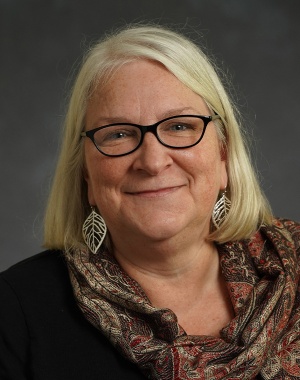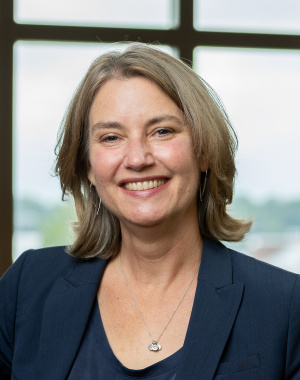
As the political polarization in America rises, navigating across differences to find common ground—and policy solutions—has never been more important. This semester, four students—Rebecca Coyne (MPP ‘26), Ella Kinder (BA '25), Breah Marie Willy (BA ‘26), Adriana Werdin (BA ‘26)—were selected as the school’s first “Bridge Builders” to help foster constructive dialogue at the school.
Led by Jennifer Niggemeier, managing director of the Ford School’s Leadership Initiative, and with support from the Volcker Alliance and the Gottesman Family, the students were empowered with the tools to facilitate meaningful dialogue among their peers using a framework developed by the Constructive Dialogue Institute.
“Employers are looking for employees with leadership and communication skills to navigate differences in perspectives among team members or in client relationships,” Niggemeier said. “They need people who know what to do when there is a divide and to not be afraid of having these difficult conversations to get to the best possible outcome.”
“We developed this program to further our students’ leadership competencies and influence student culture as a whole,” Niggemeier continued. “We were impressed by student interest in participating.”
Breah Marie Willy (BA ‘26) jumped at the chance to be part of the program. “I saw the Bridge Builders as a great way to increase my own skills to build bridges within communities and find common ground,” she said. “These are really important communication skills to have as a policy professional.”
Students were trained in the 5 Principles of Constructive Dialogue, a form of conversation where people with different perspectives try to understand each other in order to live, learn, and work together. Those principles are:
- Let go of winning
- Get curious
- Share stories
- Navigate conflict with purpose
- Find what’s shared
The Bridge Builders shared that the tools were useful in everyday encounters with roommates and family, in addition to political conversations with strangers or their own classmates.
“I didn’t expect that learning these tools would change my worldview, but it definitely did,” Willy said. She shared that before, she might choose not to engage with people with different political perspectives from her own. Now, when she’s uncomfortable, she leans into the constructive dialogue framework. “I sometimes catch myself making snap judgments about others, assuming [that I know someone’s perspective]. I tell myself to take a step back, converse, and learn their why. Sometimes it might be challenging, but I go back to the principles and ask what they care about to try to find common ground.”
The framework also provided a lens in which to apply theoretical reading from class. “Being able to take Values and Ethics alongside [learning about constructive dialogue] really strengthened my learning on both ends. I was able to apply the framework and think more deeply about how to approach other political ideologies. It helped me connect the dots.”
The Bridge Builders shared the constructive dialogue framework with others in a variety of ways. They facilitated a school-wide session with students, staff, and faculty, presented their work at the annual Gramlich Showcase, and even won an award at U-M’s Year of Democracy’s “Democracy’s Information Dilemma” showcase. Willy and Werdin also participated in the Big Ten Democracy Summit earlier this semester.
“It’s been our job to think about the framework, to practice it, and it’s become second nature for us,” said Marie Willy. “It’s important to extend these opportunities to other students by integrating this framework into the student experience and the cultural norms at the Ford School.”
Together, the Bridge Builders developed recommendations for how to incorporate constructive dialogue into new student orientation, coursework, and co-curricular programming.
“Policymaking is an exercise in finding and building upon common ground,” noted Professor Jenna Bednar, who leads the Ford School’s Resilient Democracies initiative and co-chairs U-M’s Year of Democracy and Civic Engagement. “The Bridge Builders can play a vital role in facilitating peer-led workshops to learn about constructive dialogue. It's exciting to see this path toward deepening our school's community norms of mutual respect and our capacity to harness the full potential of our beautifully diverse community.”

